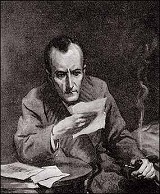“It was his particular direction that we should always, when he rang, leave his meal upon a chair, outside his door. Then he rings again when he has finished, and we take it down from the same chair. If he wants anything else he prints it on a slip of paper and leaves it.”
“Prints it?”
“Yes, sir; prints it in pencil. Just the word, nothing more. Here’s one I brought to show you - SOAP. Here’s another - MATCH. This is one he left the first morning - DAILY GAZETTE. I leave that paper with his breakfast every morning.”

“Dear me, Watson,” said Holmes, staring with great curiosity at the slips of foolscap which the landlady had handed to him, “this is certainly a little unusual. Seclusion I can understand; but why print? Printing is a clumsy process. Why not write? What would it suggest, Watson?”
“That he desired to conceal his handwriting.”
“But why? What can it matter to him that his landlady should have a word of his writing? Still, it may be as you say. Then, again, why such laconic messages?”
“I cannot imagine.”
“It opens a pleasing field for intelligent speculation. The words are written with a broad-pointed, violet-tinted pencil of a not unusual pattern. You will observe that the paper is torn away at the side here after the printing was done, so that the ‘S’ of ‘SOAP’ is partly gone. Suggestive, Watson, is it not?”
“Of caution?”
“Exactly. There was evidently some mark, some thumbprint, something which might give a clue to the person’s identity. Now, Mrs. Warren, you say that the man was of middle size, dark, and bearded. What age would he be?”
“Youngish, sir - not over thirty.”
“Well, can you give me no further indications?”
“He spoke good English, sir, and yet I thought he was a foreigner by his accent.”
“And he was well dressed?”
“Very smartly dressed, sir - quite the gentleman. Dark clothes - nothing you would note.”
“He gave no name?”
“No, sir.”
“And has had no letters or callers?”
“None.”
“But surely you or the girl enter his room of a morning?”
“No, sir; he looks after himself entirely.”
“Dear me! that is certainly remarkable. What about his luggage?”
“He had one big brown bag with him - nothing else.”
“Well, we don’t seem to have much material to help us. Do you say nothing has come out of that room - absolutely nothing?”
The landlady drew an envelope from her bag; from it she shook out two burnt matches and a cigarette-end upon the table.
“They were on his tray this morning. I brought them because I had heard that you can read great things out of small ones.”
Holmes shrugged his shoulders.
“There is nothing here,” said he. “The matches have, of course, been used to light cigarettes. That is obvious from the shortness of the burnt end. Half the match is consumed in lighting a pipe or cigar. But, dear me! this cigarette stub is certainly remarkable. The gentleman was bearded and moustached, you say?”
“Yes, sir.”
“I don’t understand that. I should say that only a clean-shaven man could have smoked this. Why, Watson, even your modest moustache would have been singed.”
“A holder?” I suggested.
“No, no; the end is matted. I suppose there could not be two people in your rooms, Mrs. Warren?”
“No, sir. He eats so little that I often wonder it can keep life in one.”